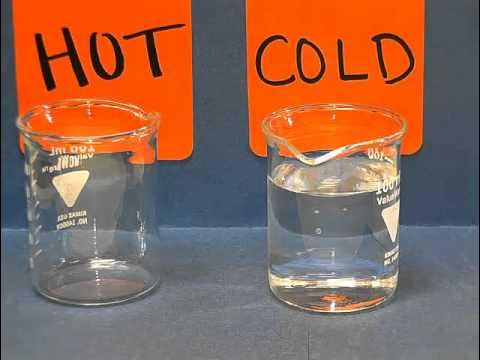Kegiatan Belajar 3 - Stimulus
Summary
TLDRThe transcript discusses the phenomenon of sugar dissolving in hot versus cold water, highlighting that sugar dissolves more quickly in hot water due to increased molecular kinetic energy, leading to faster and more frequent collisions. In contrast, the dissolution process slows down in cold water as the water molecules have less energy. This observation is then connected to the principles of chemical reactions, noting that temperature significantly influences reaction rates, as higher temperatures generally enhance both solubility and reaction speed, emphasizing the role of environmental factors in molecular interactions.
Takeaways
- 😀 Dissolving sugar in hot water is faster than in cold water.
- 💧 The temperature of the solvent affects the rate of dissolution.
- ⏳ Higher temperatures provide more kinetic energy to molecules.
- 🔄 The increased kinetic energy leads to more frequent interactions between sugar and water.
- 🧪 Chemical reactions can also be influenced by temperature, similar to sugar dissolution.
- ⚡ Faster dissolution in hot water exemplifies principles of chemical kinetics.
- 🌡️ Lower temperatures result in slower molecular movement and reactions.
- 🔍 Understanding dissolution helps illustrate broader concepts in chemistry.
- 📈 Higher temperatures generally increase reaction rates.
- ❄️ Lower temperatures can slow down chemical reactions.
Q & A
What is the main observation discussed in the video?
-The main observation is that sugar dissolves faster in hot water compared to cold water.
What happens to the kinetic energy of water molecules when the temperature increases?
-As the temperature increases, the kinetic energy of the water molecules also increases, leading to more energetic collisions.
Why does sugar dissolve more quickly in hot water?
-Sugar dissolves more quickly in hot water due to higher kinetic energy, which allows for more frequent and energetic collisions between sugar and water molecules.
How does the solubility of solids typically change with temperature?
-Generally, the solubility of many solids increases with temperature, allowing more of the solid to dissolve in hot water than in cold water.
What role does stirring play in the dissolution process?
-Stirring enhances the interaction between sugar and water, facilitating dissolution, with a more pronounced effect in hot water.
How can this discussion about sugar and water be related to chemical reactions?
-This discussion relates to chemical reactions by illustrating how increased temperature can speed up reaction rates due to increased molecular movement and collisions.
What is the relationship between temperature and reaction rates in chemistry?
-In chemistry, higher temperatures typically lead to faster reaction rates as molecules move more quickly and collide more often.
Are there any exceptions to the rule that solubility increases with temperature?
-Yes, while many solids dissolve better in hot water, there are exceptions, such as some salts whose solubility decreases with increasing temperature.
What practical applications can arise from understanding sugar dissolution in different temperatures?
-Understanding sugar dissolution can aid in cooking and food preparation, as well as in industries where solubility is crucial, such as pharmaceuticals.
What implications does the dissolution of sugar in water have for everyday life?
-The dissolution of sugar in water affects everyday tasks such as making beverages and cooking, highlighting the importance of temperature in achieving desired results.
Outlines

このセクションは有料ユーザー限定です。 アクセスするには、アップグレードをお願いします。
今すぐアップグレードMindmap

このセクションは有料ユーザー限定です。 アクセスするには、アップグレードをお願いします。
今すぐアップグレードKeywords

このセクションは有料ユーザー限定です。 アクセスするには、アップグレードをお願いします。
今すぐアップグレードHighlights

このセクションは有料ユーザー限定です。 アクセスするには、アップグレードをお願いします。
今すぐアップグレードTranscripts

このセクションは有料ユーザー限定です。 アクセスするには、アップグレードをお願いします。
今すぐアップグレード関連動画をさらに表示
5.0 / 5 (0 votes)






